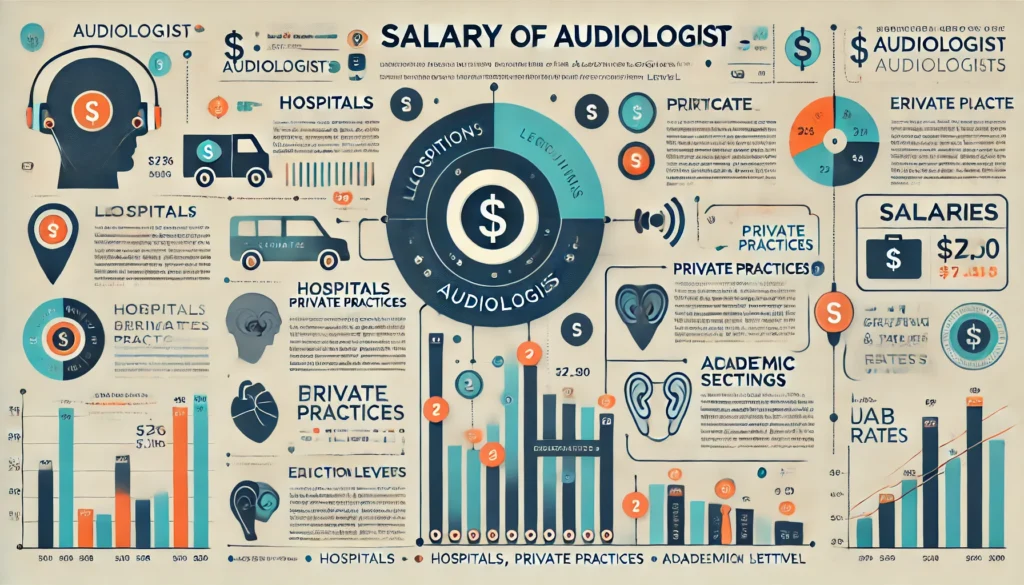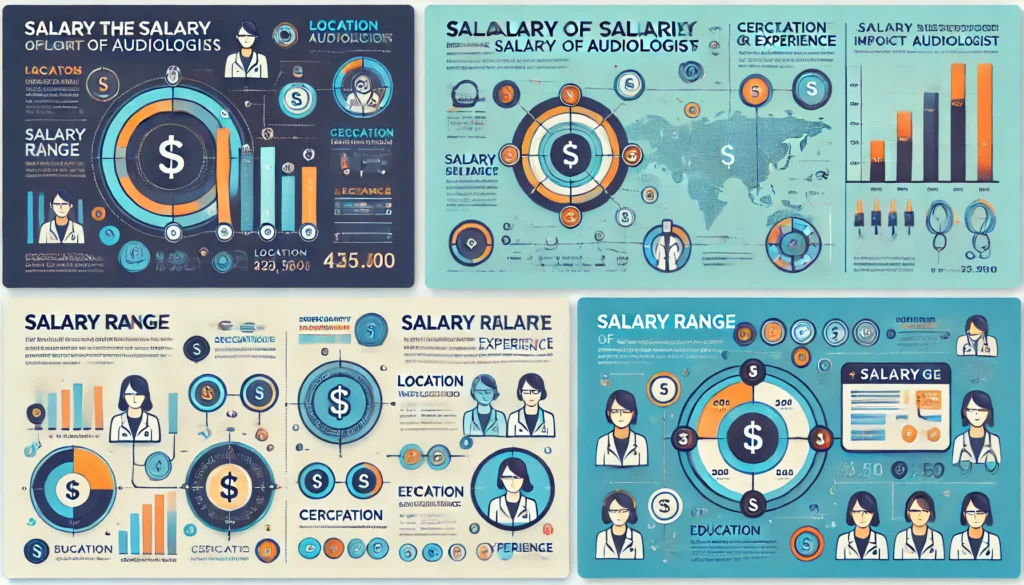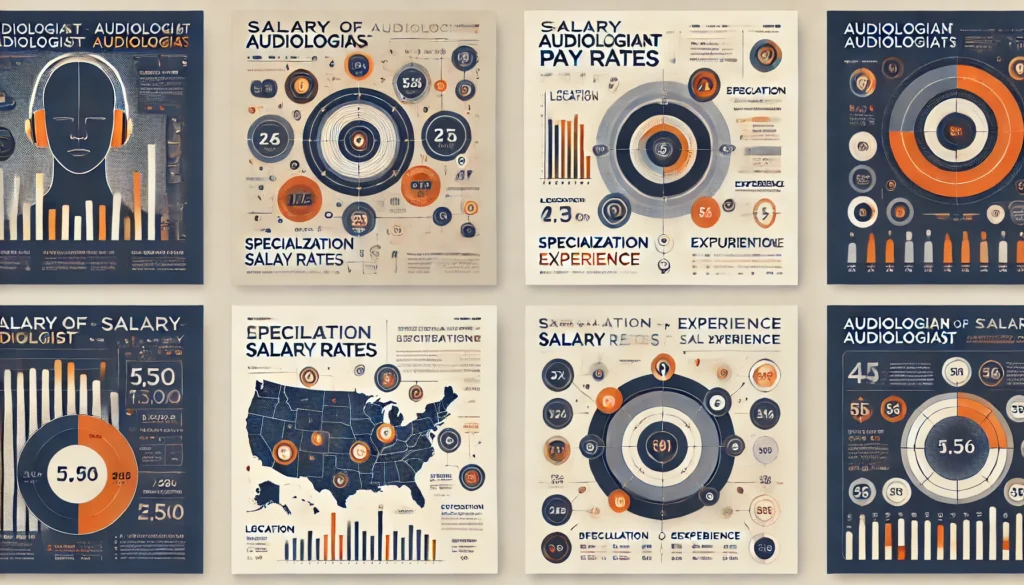Are you curious about the salary of an audiologist and what factors can influence how much they make? Audiologists play a crucial role in healthcare, diagnosing and treating hearing and balance disorders. As with any healthcare profession, understanding the financial aspects of being an audiologist is vital, especially for aspiring professionals and HR professionals looking to make informed decisions. The salary of an audiologist varies significantly based on several factors, such as certifications, subspecialties, experience, geographic location, and the type of institution they work for. This article will explore these factors and offer actionable insights into negotiating a competitive salary.

Understanding Audiologist Salary: A General Overview
What is an Audiologist?
An audiologist is a licensed healthcare professional specializing in diagnosing, managing, and treating hearing and balance disorders. Audiologists are integral to improving patients’ quality of life, particularly those with hearing loss or balance issues. They work in diverse settings, including hospitals, clinics, private practices, schools, and research institutions.
The demand for audiologists is expected to rise, with the U.S. Bureau of Labor Statistics projecting a 16% increase in audiology jobs from 2020 to 2030. However, this growth depends on several factors that influence salary levels in the field.
Typical Salary Range for Audiologists
In the United States, the salary range for audiologists can vary significantly. According to the U.S. Bureau of Labor Statistics (BLS), the median annual wage for audiologists was approximately $81,030 as of May 2022. However, depending on your geographic location, experience level, and specialization, audiologists can earn anywhere from $60,000 to over $100,000 annually.
Factors that Determine Salary in Audiology
Several elements contribute to the salary an audiologist can expect to earn. These factors include:
- Education and Certifications: Higher education and certifications can lead to higher salaries.
- Experience: More years in the field typically result in higher pay.
- Subspecialties: Specializations such as pediatric audiology or cochlear implant expertise can increase salaries.
- Geographic Location: Audiologists in major metropolitan areas or high-demand regions may earn more.
- Employer Type: Hospitals, academic institutions, and private practices may offer different compensation packages.
Understanding how these factors interact will help you better assess your earning potential.

Key Factors Influencing Audiologist Salary
Educational Requirements and Certifications
The educational path to becoming an audiologist is rigorous. It typically includes earning a Doctor of Audiology (Au.D.) degree, a four-year program following a bachelor’s degree. Audiologists must also be licensed in the state where they practice, which usually involves passing a national exam.
How Certifications Like CCC-A Impact Pay
While a basic license may be sufficient for entry-level positions, advanced certifications can significantly impact salary. For example, the Certificate of Clinical Competence in Audiology (CCC-A), offered by the American Speech-Language-Hearing Association (ASHA), is a widely recognized credential many employers prefer. Holding this certification can increase an audiologist’s earning potential, indicating higher expertise and professional commitment.
Additionally, specialized certifications in areas like cochlear implants or pediatric audiology may make an audiologist more marketable and eligible for higher-paying positions. These certifications often require additional training and experience but can lead to higher salaries due to the specialized skills required.
The Role of Continuing Education in Salary Increases
Audiology is an ever-evolving field, and continuing education is essential for staying up-to-date with the latest developments. Audiologists pursue additional training or certifications in niche areas, such as vestibular audiology or auditory processing disorders. These advanced certifications can open doors to higher-paying roles, such as supervisory or academic positions.
Experience and Career Growth
Experience plays a significant role in determining an audiologist’s salary. Entry-level audiologists typically earn less than their more experienced counterparts, but salary growth is steady as they gain expertise.
Salary Progression with Years of Experience
The salary for an audiologist tends to increase with experience. According to the BLS, audiologists with less than one year of experience can expect to earn an average salary of around $69,000 annually. However, those with 5-9 years of experience see a significant jump, earning about $84,000 on average. With over 20 years in the field, an audiologist can earn upwards of $95,000 annually.
This career trajectory offers promising salary increases but emphasizes the importance of building a strong reputation, honing skills, and pursuing professional development opportunities.
Impact of Specializations and Subspecialties on Salary
Audiologists who specialize in certain subspecialties can expect a salary boost. Some areas of specialization may command higher compensation due to the specialized skills and expertise required.
For instance:
- Pediatric Audiology: Audiologists who work with children, especially those with developmental delays or complex hearing issues, may earn higher salaries due to the unique challenges and patient needs.
- Cochlear Implants: Professionals with expertise in cochlear implants may also earn a premium. These roles often require specialized training and experience, as cochlear implants involve advanced technology and procedures.
- Industrial Audiology: Audiologists who work in industrial or occupational settings, helping workers prevent hearing loss due to workplace noise, can also see higher pay.
While specialization can increase salary, it also demands a commitment to continuous learning and may involve a more intense work schedule.

The Role of Audiology Subspecialties in Salary Determination
Pediatric Audiology
Pediatric audiologists work with children, often diagnosing and treating hearing loss and other hearing-related issues in young patients. Due to the specialized knowledge and skills required to assess and treat children, pediatric audiologists typically earn higher salaries than general audiologists.
The salary for pediatric audiologists can vary, but it often exceeds the median salary for audiologists, especially in high-demand areas. Factors such as the level of expertise, location, and the institution where they work can impact how much a pediatric audiologist earns.
Salary Comparisons for Pediatric Specialists
While a general audiologist may earn around $81,000 annually, pediatric audiologists in specialized clinics or hospitals may earn between $85,000 and $100,000 annually, particularly in major metropolitan areas with high demand for pediatric specialists.
Growth Opportunities and Demand in Pediatric Audiology
The demand for pediatric audiologists is expected to rise, especially as more children are diagnosed with hearing impairments or related disorders. As this subspecialty continues to grow, salary opportunities will also likely increase.
Cochlear Implant Audiology
Audiologists specializing in cochlear implants are in high demand due to the complexity of the procedures and the growing use of cochlear implants in treating severe hearing loss. These audiologists typically earn higher salaries than their generalist counterparts.
How Cochlear Implants Affect Salary Levels
A cochlear implant audiologist’s salary can range from $85,000 to $100,000 per year, depending on experience and location. Their expertise in programming and troubleshooting cochlear implants and providing post-implantation care make them a valuable resource, which is reflected in their compensation.
The Growing Need for Cochlear Implant Specialists
As technology advances and more patients seek cochlear implants, the demand for audiologists in this area will continue growing. This increase in demand will likely result in further salary increases for cochlear implant specialists.
Clinical vs. Research Audiologists
While clinical audiologists primarily diagnose and treat patients, research audiologists focus on advancing the field of audiology through scientific studies and trials. Though research audiologists may earn less than their clinical counterparts, they can contribute to innovations in hearing loss treatment.
Salary Differences Between Clinical Audiologists and Research Audiologists
Clinical audiologists often earn salaries from $80,000 to $95,000 annually. In contrast, research audiologists may earn slightly less, typically between $70,000 and $85,000. However, those working in academic or prestigious research institutions may earn comparable salaries, especially if they contribute to significant breakthroughs in audiology.
Job Satisfaction in Clinical vs. Research Audiology
While clinical audiology directly impacts patient care, research audiology offers opportunities for those interested in scientific discovery. Both paths offer rewarding career opportunities, but the salary variation depends on the role and institution.

Tips for Negotiating Your Audiologist Salary
Building a Strong Resume for Higher Pay
A well-rounded resume is one of the best ways to ensure a competitive salary. Highlight your certifications, years of experience, and any specialized training you have undergone. Show your potential employer that you have the qualifications and skills to excel in a specialized role.
The Importance of Certifications and Subspecialties
Make sure to emphasize any certifications and subspecialties you hold. For example, if you are certified in cochlear implants or pediatric audiology, mention this expertise, as it can greatly enhance your value.
How to Highlight Your Experience and Education
In addition to certifications, your experience is a key factor in salary negotiations. If you have several years of experience in a specialized area, such as cochlear implants, make this clear on your resume and during interviews.
Understanding Your Worth in the Job Market
Before entering salary negotiations, research the average salary for audiologists in your area. Use resources like the BLS, industry salary surveys, and job listings to understand what professionals with your qualifications are earning.
Tools to Research Average Salaries in Your Area
Salary research tools such as Payscale and Glassdoor can help you understand the current compensation landscape for audiologists. This knowledge will give you a stronger bargaining position during negotiations.
Salary Negotiation Strategies
When it comes to negotiating your salary, timing and preparation are key. Be ready to discuss your unique qualifications and the value you bring to the table.
Looking to increase your earning potential in healthcare? Discover comprehensive salary negotiation strategies tailored to healthcare professionals.
Conclusion
In conclusion, an audiologist’s salary is influenced by various factors, including certifications, subspecialties, and geographic location. By understanding these elements, aspiring audiologists can make informed career decisions and negotiate competitive salaries. Whether you are just starting or looking to specialize, knowing what drives your pay can help you maximize your earning potential and achieve career success in this rewarding field.
Trusted Sources on Audiologist Salary
| Source | Data Provided | Link |
|---|---|---|
| U.S. Bureau of Labor Statistics | Average salary for audiologists in the U.S. | BLS Audiologist Data |
| American Speech-Language-Hearing Association | Salary and career trends for certified audiologists | ASHA Career Information |
| Payscale | Salary ranges for audiologists based on experience | Payscale Audiologist Salary Data |
| Glassdoor | Audiologist salaries across different industries | Glassdoor Audiologist Salaries |
| American Academy of Audiology | Information on salaries based on specialization | AAA Career Information |
FAQ about Salary of Audiologist
Q1: What is the average salary of an audiologist?
The average salary of an audiologist in the U.S. is approximately $81,030 per year, according to the U.S. Bureau of Labor Statistics (BLS). However, salaries can vary based on experience, location, and specialization.
Q2: How does location affect the salary of an audiologist?
Geographic location plays a significant role in determining an audiologist’s salary. Audiologists in major metropolitan areas or regions with a higher cost of living tend to earn higher salaries. For instance, audiologists working in California or New York may see higher pay than those in rural areas.
Q3: Do audiologists earn more with certifications?
Yes, holding advanced certifications such as the Certificate of Clinical Competence in Audiology (CCC-A) or specializing in pediatric audiology or cochlear implants can increase an audiologist’s salary. Specialization typically leads to higher demand and higher pay.
Q4: What are the best-paying subspecialties in audiology?
Pediatric audiology, cochlear implant audiology, and industrial audiology are some of the highest-paying subspecialties in the field. Audiologists in these areas often earn more due to the specialized knowledge and skills required.
Q5: How can I negotiate a higher salary as an audiologist?
To negotiate a higher salary, highlight your certifications, years of experience, and any specialized skills you bring. Research the average salary in your area using resources like Payscale or Glassdoor, and be prepared to justify why your skills warrant a higher salary.







